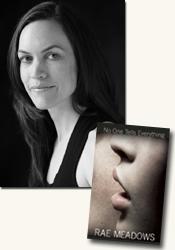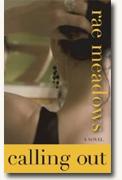author interview
book reviews:
· general fiction
· chick lit/romance
· sci-fi/fantasy
· graphic novels
· nonfiction
· audio books
· author interviews
· children's books @
curledupkids.com
· DVD reviews @
curledupdvd.com
newsletter
win books
buy online
links
home
for authors
& publishiss
for reviewers
The maga Portunista and her colorful subcommanders lead a ragged, outnumbered brigade in the wake of an international war, against her increasingly ruthless adversaries. But the ambitious commander finds herself irreconcilably drawn to a charismatic, kind and hopeful stranger. Click his e for more on Cry of Justice or read our review.
|
|||||
 
Michael Leonard interviewed author Rae Meadows about her novel No One Tells Everything Interviewer Michael Leonard: What were the circumstances that initially attracted you to write No One Tells Everything Rae Meadows: Years ago, before I wrote Calling Out, I thought I wanted to write a non-fiction book about a local murder that captured my attention, and I went so far as to exchange letters with the young man who was arrested and eventually convicted of the crime. But it became clear that he was mentally ill, and I realized I wasnít cut out to write a book that would potentially hurt him, his family, or the victimís family in some way. A friend of mine then asked me why I was so interested in the first place, and the paradigm instantly shifted in my head to a novel about a woman who becomes obsessed with a murder. It just felt right. Grace is such a complex and multi-faceted character. Did you base her on someone you know or is she totally fictional? She is fictional but I admit there is a little of me in Grace, if perhaps me taken to a pathological extreme. I wanted to create a flawed character who is not altogether likeable, one who on the surface appears to be okay but is really one very short step away from tumbling over the edge. We first meet Grace when she's thinking, observing (and of course drinking) in Chances. She ruminates on her "blandness of sexual invisibility," but then she's flattered when some guy across the bar leaves her his number. What do you think this tells us about Grace's character? You have hit on what I think is one of the essential elements of Graceís character in that she is a keen observer of life around her yet completely out of touch and unreliable when it comes to herself. I think that this is a defense mechanism but also that years of estrangement from all areas of her life have left her with a warped self-perception.
I see Jimmy as Graceís tether, a constant, but one with whom she can still keep a safe distance. The bar is physically between them, a barrier against divulging too much and feeling too vulnerable. He doesnít ask a lot of her and he makes her feel better about spending time in the bar night after night. From the outset Grace is more intrigued by Sarah Shafer's possibilities than of her own. Why? At what point do you think she makes the decision to find out more about Sarah? Grace seems to have long ago given up on herself and in Sarah she sees someone who might still have a chance. Itís not coincidence, of course, that Sarah reminds Grace of her ebullient, long-dead sister. In the wake of a series of failuresódumped by the married professor, turned down for all the jobs she applied foróGrace latches on to the story of the murder as a surrogate for taking action in her own life.
Brian, with his "mixture of confidence and adolescent uncertainty," constantly pops up throughout the story. He's such an endearing character and almost acts like a buffer to Grace's willing self-destruction; but Grace's feelings for him always seem veiled in uncertainty and denial. How do you perceive their relationship? Iím glad you like Brian. (I like him too!) Grace couches her reluctance to let him into her life in cynicism, but I think that is masking a fear that she doesnít deserve what he has to offer. His earnestness is scary to her because she doesnít open up to anyone. I root for Brian even as I know he has no idea what heís up against with Grace. You describe Callie's death as "the first domino to fall." What do you mean by this? Ultimately, how do you think that Callie's accident has shaped Grace's life so far? Grace sees Callieís death as the reason that her life went askew. Itís the point where she started to shut down, and to which all her failures can be traced. But I think we also sense that Grace uses her sisterís death as an excuse for not getting her life together. Grace is distant from her parents, and is reluctant to return home when her mother calls with the news of her father. Is it just her childhood traumas that prevent her from being fully honest with them about returning to the fold, or is it something more? In New York, Graceís routine within her isolated bubble makes her feel in control. Her drinking both fuels and ameliorates her inertia. But with the intrusion of her parents and a return to her childhood home, she is yanked back into a role where she no longer feels in control, and all the old resentments bubble up. But I think there is also something about being with her family that forces her to look at herself with more honesty than she is used to, a prospect she has resisted for years. Grace has a complex relationship with her father. You hint that she once had a childhood crush on him, yet there are also hints of betrayal and disappointment. With this in mind, do you think her relationship with her father is linked to his decision not to talk about Callie's death? Absolutely. On a basic level, Grace has always been after her fatherís approval, but she senses that her father blames her for Callieís death. There is a lot of unspoken tension between them. His edict to not talk about Callie confirms Graceís fear that she will never be able to compete with Callieís ghost for his affections.
I think in Charles she sees a fellow misfit, someone sensitive and misunderstood, someone who never fit in. Someone who no one cared enough about to ever get to know. Through her cock-eyed lens, she sees someone who she might be able to save in a way that feels vital after she couldnít save her sister. Grace's investigation into Charles's life gradually triggers her memories. How much do you think the exploration of his case contributes to the cracks that eventually appear in Grace's own childhood? Oh, I think Graceís pursuit of Charlesís story is wholly responsible for her own childhood memories surfacing. She might have self-destructed on her own but Iím not sure she would have come to the same realizations. As she is further drawn into Charlesís story, and lives more recklessly in pursuit of that story, the rickety construction that has held her memories in check starts to teeter. When Grace has a one-night stand and starts drinking ever more heavily, is she subconsciously punishing herself for her assumed role in Callie's death, or are there more issues at stake? I think youíre right that she is punishing herself the closer she gets to the truth of her own past, but I also think that in some strange way, believing that she will save Charles allows Grace to give into the self-destructive urges that have been tugging at her for years. When Grace sees Charles for the first time in court, it jumpstarts Charles's own narrative voice. Why did you pick this part of the novel to insert his point of view? I chose this point to introduce Charlesís interior, and employed a second person voice, because I wanted to filter the readerís relationship with Charles through Grace. I wanted the reader to see him through Graceís eye, and feel for him with her. Do you think Grace's relationship with her parents would have been different if Callie had not died so tragically and such abrupt circumstances? I think losing a child inflicted significant psychological wounds on Graceís parents, which caused them to withdraw further into stoicism and alcohol. But even before Callie died, all was not well within the family unit--repression and denial were rampant - so my guess is Graceís relationship with her parents might still have been a little chilly.
First of all, thank you, that is a meaningful compliment because for me that aspect of writing the novel was quite a challenge. And yes, with two characters who are not good communicators, showing childhood scenes allowed more authentic windows into their emotional make-ups. What are the most significant contrasts between Grace and Charles? Alternatively, why is their story so similar? Grace and Charles come from similar backgrounds, each with a golden sister, distant parents, a fairly solitary existence, and the burden of guilt. But Grace has in many ways chosen her isolation, whereas Charles has tried everything possible to be like everyone else but failed. I think there is a sense that Grace can still right the ship or at least keep it afloat, and that Charlesís ship, to keep the nautical metaphor going, may be listing too far to one side to ever hoist it back up on his own. The power of memory is a theme that reverberates throughout. What were you trying to tell us about memory? Memory is slippery and inchoate, with trapdoors and secret passageways, and it is, by nature, unreliable and selective. In many ways, I think a memory of an event can become more powerful than the event itself, more destructive, more consuming, especially when shaped by oneís fear, guilt, need, insecurity, etc. But memories are, of course, all weíve got to go on, for better or for worse, so thereís no getting away from them, no way of wishing them away or ignoring them as Grace has tried to do. You juxtapose some of the sleaze of Manhattan with the suburban beauty and tranquility of Cleveland. How difficult was it to place Grace in both of these places? To be honest, it wasnít difficult because Iíve lived in both places, and they worked out well as disparate landscapes for Grace. I now live in Madison, WI, but before that I lived in Brooklyn and I grew up in a suburb of Clevelandóin the book, both locations are fictionalized versions. As with Salt Lake City in Calling Out, I find it easier to write about a place after I have left it and Iím not beholden to exact representation. What did you find most satisfying in writing No One Tells Everything I would have to say the sections from Charlesís point of view were both the easiest and most wrenching to write, and ultimately the most satisfying. Probably the most difficult part of writing the novel was knowing how much to reveal and when. I ask the reader to make some leaps and the success of those leaps is dependent on not feeling duped or knowing whatís going to happen long before the protagonist does. Which authors have most inspired you to write? I am a narrative junkie and I find writing inspiration all over the place. Some works that come to mind: The Wire, Deadwood, and Freaks & Geeks on the small screen, the movies LíEnfant, Badlands, The Good Girl, and McCabe and Mrs. Miller, and books such as Winesburg, Ohio (Sherwood Anderson), Play it as it Lays (Joan Didion), A Fanís Notes (Frederick Exley), Bad Behavior (Mary Gaitskill), In Cold Blood (Truman Capote), The Sun Also Rises (Ernest Hemingway), The Sheltering Sky (Paul Bowles), Gilead (Marilyn Robinson), The Virgin Suicides (Jeffrey Eugenides), Unless (Carol Shields), and recently Last Night at the Lobster (Stewart OíNan). Are you working on another novel? If so, can you share something about it with us? I have an eight-month-old baby, so working has come to mean something different than it used to. But I am developing a novel entitled Orphan Train, a three-part narrative, one strand of which is about a street girl in turn-of-the-century New York who is put on an orphan train heading to Wisconsin to be adopted by a farm family. Itís a departure for me but Iím excited to try my hand at a period story. What would you most like readers to take away from No One Tells Everything On one hand, the novel explores the power of empathy, which I hope comes across. Grace is a character who looks beyond the easy and accepted encapsulation of Charles, and who finds redemption, I think, through their shared humanity. On the other hand, I hope readers are engaged and moved--- what I hope for when I read a novel. If they come away feeling like they have read a good story, that would be great! Rae Meadows (one of Poets & Writers Five Debut Writers to Watch ) is a graduate of Stanford University and the MFA program at the University of Utah. She is the author of the novel Calling Out, named one of the best books of 2006 by The Chicago Tribune. Her stories have appeared in various literary magazines, most recently in Avery: An Anthology of New Fiction. She lives in Madison, Wisconsin. Michael Leonard is a contributing editor of curledup.com. His interview with Rae Meadows was written in conjunction with his review of No One Tells Everything. © Michael Leonard/2008.
|
|||||
| fiction · sf/f · comic books · nonfiction · audio newsletter · free book contest · buy books online review index · links · · authors & publishiss reviewers |
|
| site by ELBO Computing Resources, Inc. | |



